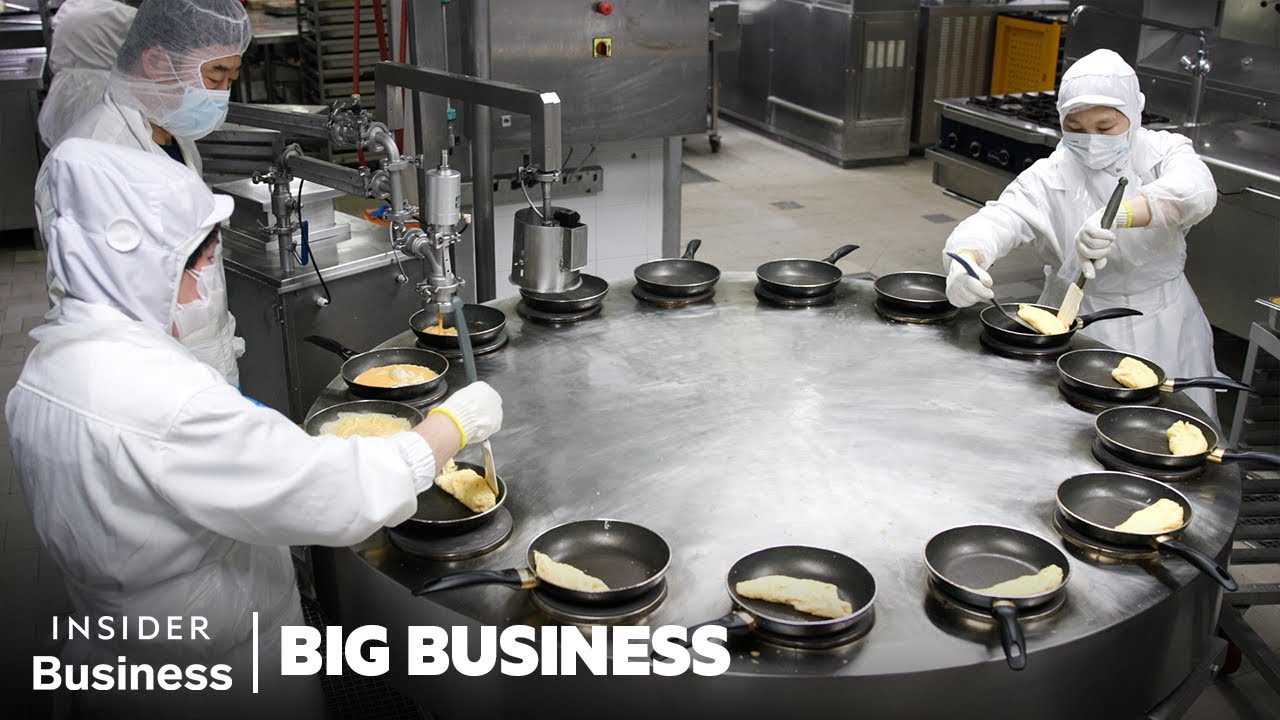We’ve seen emergence of cloud kitchens recently, specifically thinking of companies like Rebel Foods, but even in the few images that Rebel Foods publishes, it doesn’t look like the typical factory streamlined process. This video is one of the few things I could find, and even then I had to go out of my way to find it. Developments like these would really strengthen the working class by dropping the value of food.
I’m a cafeteria communist. Imagine how much cheap/free healthy food could be made and distributed with a chain of cafeterias coordinated with sustainable agricultural practices.
Word. Seriously every x number of people should have a community cafateria it’s absolutely wild this doesn’t exist.
I found a YouTube link in your comment. Here are links to the same video on alternative frontends that protect your privacy:
The industrialization of kitchens is just fast food. A bunch of frozen shit from factories get distributed amongst all the chain spots with hyper optimized supply chain logistics
People who open a kitchen all want to make the best food that they can with their budget. Because food in industrialized countries is all an art and chefs/owners want to be able to feel proud of their work. Industrializing it could only come from a capitalist who just wants to maximize profits with no care about the quality and the best way to do that is through fast food chains
We don’t actually need any of this to “strengthen the working class”. We’ve already figured out modern agricultural science to produce a surplus, it’s just imperialists that prevent everybody from obtaining that (US using the World Bank/iMF to prevent Africa from becoming self sustaining + biowarfare against their enemies like Cuba and China to kill their livestock)
Fast food & microwave dinners are a form of industrialized kitchens but not the only one it can take. You can also have centralized factories that produce thousands of boxed lunches per day. Japan does this with ekiben for example.
Cooking is a part of domestic labor. It takes up free time out of work, it’s unpaid, its workers tend to be women, and it’s individual instead of socialized labor. Everyone ought to be able to cook for themselves if they want, but automation and collectivization of cooking (and the domestic sector in general) is desirable.
You can also have centralized factories that produce thousands of boxed lunches per day. Japan does this with ekiben for example
Is this not the same as microwave dinners and sandwiches at gas stations but with a Japanese accent
but automation and collectivization of cooking (and the domestic sector in general) is desirable
Agreed, but it’ll be probably just be restaurants and cafeteria style imo instead of industrialized food at the scale of OP’s video
Industrial kitchens are a thing, mostly in food manufacture as far as I know. You know, baking massive numbers of frozen meals or whatever to precise standards at a rapid pace.
idk, people do be individualizing shit. I sometimes yearn for the bygone days where you just showed up at an inn and they were like “Okay so your options are eternal stew with bread and cheese, or you can go hungry. What’ll it be?” Restaurants should have one menu item with substitutions and shit for specific food needs.
lol, though, I just thought that apparently back in the day in China and it’s environs “modern” sit down restaurants have been a thing for like 2k years, and of course cities throughout history had fast-food restaurants and food stalls and stuff.
Restaurants should have one menu item with substitutions and shit for specific food needs.
That concept seems pretty in at the moment, I’ve seen a few small restaurants where the chef just cooks whatever they feel like that night and that’s all you’re getting. It’s not cheap or communal though, they’re usually pretty up-market.
Food that’s non perishable is already mass produced. Spam, tuna, beans, rice, sardines, pickles, jam/jelly, iced creams, beer, etc.
Food that’s perishable shouldn’t be industrialised. At the very least not in the way car manufacturing or newspaper printing are.
You create a factory that pushes out caviar omelettes en masse with a shelf life of 12 hrs, you’re either going to have masssive losses or wastage very often or you’re not meeting demand. This won’t lower the value of food and probably won’t strengthen the working class.
Even if it’s just, say, scrambled eggs, and you have exact knowledge of how many customers you will have (say, you’re the only food source in a factory/mine/offshore oil rig), wastage with uneaten food would be fairly high. If you’re not feeling well and you’re not hungry and don’t want a can of tuna with some rice, don’t get it, it’s still good. If you’re not hungry but the chef’s have already prepped hot food accounting for you on this oil rig, it’s going in the trash.
In a civilian restaurant, the whims of the weather, price of fuel that particular week, or a cancelled event in town could mean your scrambled eggs are sold out one day and 99% unsold the next.
My favourite communist pipe dream is the neighborhood kitchen.
It kind of exists in Japan, but not in America. There’s a large bento market there, so they have genuine factories that produce them. This one ekiben factory produces 2,000 onigiris and 8,000 bentos per day, for instance. Ekiben are usually somewhere around ¥1000. Food in Japan is cheaper than America in general. Although I think wages are lower too? Also they have a lot of vending machines. So as to why their food industry is the way it is, I have no idea. In the Soviet Union, their solution to the cooking problem was cafeterias.
Japan and much of east Asia also has strong cafeteria culture. Because schools, universities, and large workplaces tend to have cafeterias, it’s not uncommon for working people to have cafeteria food for lunch every weekday till retirement.
The key is that cafeterias are considered a cost to be subsidized rather than a profit making activity, which means that cafeterias serve reasonable quality food at good prices rather than barely nutritionally adequate slop prepared by the lowest bidder.
A Japanese friend of mine told me about how she went on exchange to an American university and was excited to try out the cafeteria plan she was forced to buy. She said that she ate there once and it was so awful that she immediately went to the student office to beg for a refund citing a fictional financial emergency.
I found a YouTube link in your comment. Here are links to the same video on alternative frontends that protect your privacy:
This is one of my favorite videos on the Internet (contains the preparation of meat products):
I found a YouTube link in your comment. Here are links to the same video on alternative frontends that protect your privacy:
I found a YouTube link in your post. Here are links to the same video on alternative frontends that protect your privacy:








